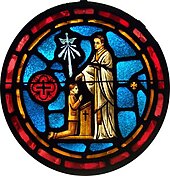
Back Vormsel Afrikaans Konfirmation ALS سر الميرون Arabic ܡܘܪܘܢ ARC تثبيت ARZ Miropomazaniye Azerbaijani Мірапамазаньне BE-X-OLD Kouzoumenn Breton Confirmació Catalan Biřmování Czech

In Christian denominations that practice infant baptism, confirmation is seen as the sealing of the covenant created in baptism. Those being confirmed are known as confirmands. For adults, it is an affirmation of belief.[1] The ceremony typically involves laying on of hands.
Catholicism views confirmation as a sacrament. The sacrament is called chrismation in Eastern Christianity. In the East it takes place immediately after baptism; in the West, when a child reaches the age of reason or early adolescence, or in the case of adult baptism immediately afterwards in the same ceremony. Among those Christians who practise teenage confirmation, the practice may be perceived, secondarily, as a coming of age rite.[2][3]
In many Protestant denominations, such as the Anglican, Lutheran, Methodist and Reformed traditions, confirmation is a rite that often includes a profession of faith by an already baptized person. Confirmation is required by Lutherans, Anglicans and other traditional Protestant denominations for full membership in the respective church.[4][5][6] In Catholic theology, by contrast, it is the sacrament of baptism that confers membership, while "reception of the sacrament of Confirmation is necessary for the completion of baptismal grace".[7] The Catholic and Methodist denominations teach that in confirmation, the Holy Spirit strengthens a baptized individual for their faith journey.[8][9]
Confirmation is not practised in Baptist, Anabaptist and other groups that teach believer's baptism. Thus, the sacrament or rite of confirmation is administered to those being received from those aforementioned groups, in addition to those converts from non-Christian religions.
The Church of Jesus Christ of Latter-day Saints (LDS Church) does not practise infant baptism, but individuals can be baptized after they reach 8 years old (the age of accountability). Confirmation in the LDS Church occurs shortly following baptism, which is not considered complete or fully efficacious until confirmation is received.[10]
There is an analogous ceremony also called confirmation in Reform Judaism.[citation needed] Various secular organizations also offer secular coming-of-age ceremonies as an alternative to Christian confirmation, while Unitarian Universalists have a similar Coming of Age ceremony.
- ^ "Catechism of the Catholic Church – IntraText - III. The Effects of Confirmation". The Holy See. 1303. Archived from the original on 17 September 2021. Retrieved 11 May 2023.
- ^ "Glossary". Episcopal Church. Archived from the original on 29 April 2016. Retrieved 6 October 2017.
- ^ "Belief & Practice: Confirmation". Religion & Ethics NewsWeekly. PBS. 13 July 2001. Archived from the original on 10 March 2013. Retrieved 26 August 2017.
- ^ The Lutheran World Almanac and Annual Encyclopedia for 1921. Lutheran Bureau. 1921. p. 68.
In this connection it should be stated that as it is the custom of the Lutheran Church to receive into full membership only those who have been confirmed
- ^ Dada, Adelowo, E. (2014). Perspectives in Religious Studies: Volume II. HEBN Publishers. p. 209. ISBN 978-9780814465.
Confirmation in the Anglican Communion is the laying on of hands (of the Bishop) upon those who are baptised and have come to years of discretion. In this case, it involves those baptised both at infancy and adulthood. It is the attainment of this status, among other conditions, that determines, in the Anglican Church, full membership of the Church and eligibility to be admitted to the Lord's Table, and to enjoy certain rights of the Church.
{{cite book}}: CS1 maint: multiple names: authors list (link) - ^ "Order of Service for the Reception of Baptized Persons into the Full Membership of the Church commonly called Conformation". Society of Archbishop Justus. 1950. Archived from the original on 24 June 2017. Retrieved 7 June 2017.
- ^ "Catechism of the Catholic Church – IntraText". vatican.va. Archived from the original on 9 June 2011. Retrieved 6 October 2017.
- ^ Cite error: The named reference
MCGB2014was invoked but never defined (see the help page). - ^ Cavadini, John C. (17 July 2018). "Confirmation strengthens our identity as children of God". Catholic Philly. Archived from the original on 27 January 2021. Retrieved 28 March 2021.
- ^ "Confirmation – the Encyclopedia of Mormonism". Archived from the original on 17 January 2018. Retrieved 16 January 2018.